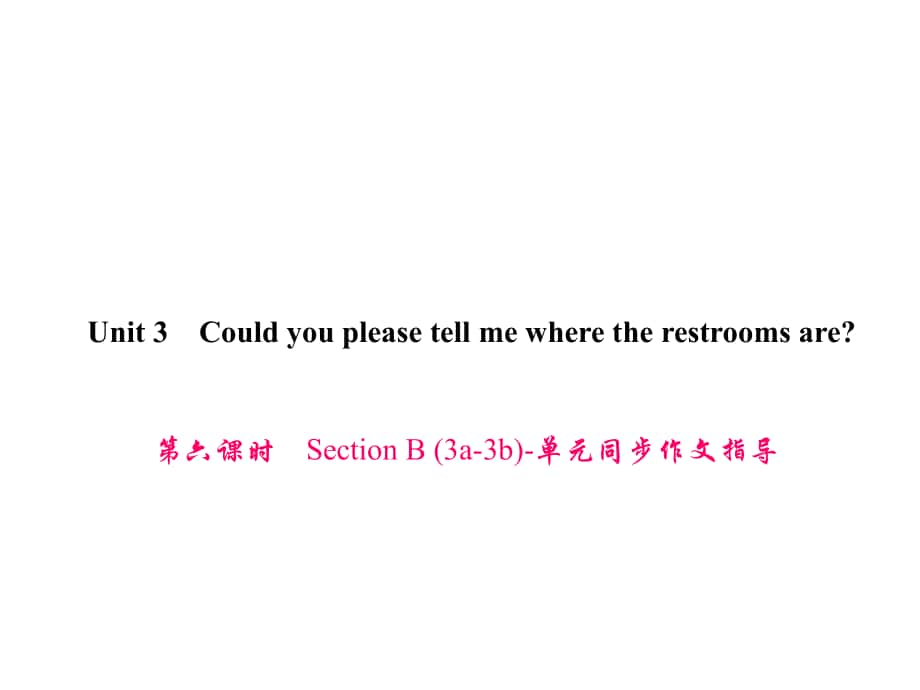《原九年級(jí)英語全冊(cè) Unit 3 Could you please tell me where the restrooms are(第6課時(shí))Section B(3a3b)同步作文指導(dǎo)課件 (新版)人教新目標(biāo)版》由會(huì)員分享��,可在線閱讀���,更多相關(guān)《原九年級(jí)英語全冊(cè) Unit 3 Could you please tell me where the restrooms are(第6課時(shí))Section B(3a3b)同步作文指導(dǎo)課件 (新版)人教新目標(biāo)版(10頁珍藏版)》請(qǐng)?jiān)谘b配圖網(wǎng)上搜索�����。
1����、Unit 3Could you please tell me where the restrooms are?第六課時(shí)Section B (3a3b)單元同步作文指導(dǎo) 在我們?nèi)粘I詈蛯W(xué)習(xí)中����,常常需要從他人那里獲取一些信息。本單元談?wù)摰闹饕掝}就是如何禮貌地向他人詢問信息�����。英語新課程標(biāo)準(zhǔn)的第五級(jí)語言技能目標(biāo)中要求學(xué)生能“有效地詢問信息和請(qǐng)求幫助”�,故本單元話題是歷年各省、市中考的一大熱點(diǎn)話題���,同時(shí)在我們平常交際中也具有很強(qiáng)的實(shí)用性���。具體到書面表達(dá)中,內(nèi)容涉及很廣���,如問路和指路��、感謝某人����、詢求幫助、詢問某方面相關(guān)信息等��。教材中出現(xiàn)的相關(guān)句型:My name is.and Im from.我叫�����,我
2����、來自Ill be coming to your school for.我將來你的學(xué)校Id like to know about.我想知道關(guān)于I would like to thank you for.我想感謝你Im looking forward to your reply.我盼望著你的回復(fù)。拓展常用句型:Could you tell me where I can.���?你能告訴我在哪兒我能�����?Could you please tell me how to get to.�����?你能告訴我怎么到嗎�?The supermarket is between the flower store and the bo
3、okstore.超市在花店和書店之間�����。I wonder when the park closes today.我想知道今天公園什么時(shí)候關(guān)門��。I wonder where we should go next.我想知道下一次我們應(yīng)該去哪兒���。Go past the bookstore.經(jīng)過書店。Turn right/left.向右轉(zhuǎn)/左轉(zhuǎn)����。下周六是你的生日。你準(zhǔn)備在家里開一個(gè)生日晚會(huì)�,并邀請(qǐng)你的朋友參加。晚會(huì)七點(diǎn)開始���。你家就住在友好路60號(hào)���,可以乘坐33路公交車在復(fù)興路下車。你家在車站的對(duì)面��。房子是紅色的�,門是黃色的�,很容易找到��。請(qǐng)根據(jù)所給信息��,給你的好友玲玲寫一封80100詞的信��,信的內(nèi)容包括邀請(qǐng)
4�����、其參加晚會(huì)���,指明晚會(huì)的時(shí)間����、地點(diǎn)�,你的住址及如何到達(dá)等內(nèi)容。Dear Lingling����,Next Saturday is my birthday.Im going to have a birthday party at home in the evening.It will start at 7:00.Would you like to come?Ive also asked some other classmates of ours and some of my friends to come.I live at No.60 Youhao Road.You can take Bus No.3
5����、3 and get off at the stop of Fuxing Road.My house is just on the other side of the road.Its a red house with a yellow door.You cant miss it.I hope you will come.Yours���,【點(diǎn)評(píng)】本文根據(jù)要求,詳細(xì)說明了晚會(huì)的時(shí)間�、參加人員及自己的地點(diǎn)。語言流暢��,時(shí)態(tài)使用準(zhǔn)確����。如:處用be going to句型表示要發(fā)生的事。處用現(xiàn)在完成時(shí)態(tài)�,表明已經(jīng)完成的事。短語使用恰當(dāng)���。如:處on the other side of“在的另一邊”。假如你是李軍����,
6、你打算和父母去北京旅游�����,紅星(Red Star)旅行社將為你們提供全程服務(wù)�����。請(qǐng)你根據(jù)以下提示給紅星旅行社的主管張先生(Mr. Zhang)寫一封電子郵件,咨詢一下有關(guān)情況���。提示:1.旅行車上游客的數(shù)量����;2賓館是否有帶大窗戶的三人間�;3賓館附近是否有游泳池;4飯菜是否可口���,種類多樣���。要求:1.根據(jù)提示內(nèi)容進(jìn)行寫作,可適當(dāng)發(fā)揮���;2恰當(dāng)運(yùn)用本單元所學(xué)表達(dá)方式Could you (please) tell me.?3詞數(shù):80100詞(電子郵件的開頭已給出�,不計(jì)入總詞數(shù))�。One possible version:Dear Mr. Zhang,As a visitor�����,Id like to ask y
7、ou some questions.Could_you_please_tell_me_how_many_visitors_there_will_be_on_the_bus���?Will_it_be_crowded����?Then_I_wonder_if_we_can_stay_in_a_room_with_a_big_window_for_three_people.We_can_enjoy_the_scenery_through_the_window.And_is_there_a_swimming_pool_near_the_hotel_where_we_can_swim_to_keep_cool��?Finally����,could_you_please_tell_me_if_the_hotel_will_serve_many_kinds_of_delicious_food?I_would_like_to_thank_you_for_telling_me.Please_write_to_me_soon.Yours����,Li_Jun
 原九年級(jí)英語全冊(cè) Unit 3 Could you please tell me where the restrooms are(第6課時(shí))Section B(3a3b)同步作文指導(dǎo)課件 (新版)人教新目標(biāo)版
原九年級(jí)英語全冊(cè) Unit 3 Could you please tell me where the restrooms are(第6課時(shí))Section B(3a3b)同步作文指導(dǎo)課件 (新版)人教新目標(biāo)版

